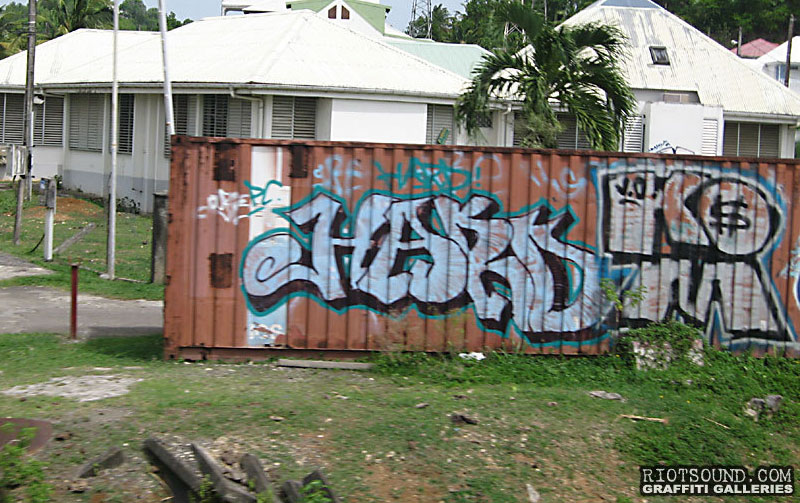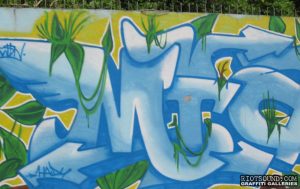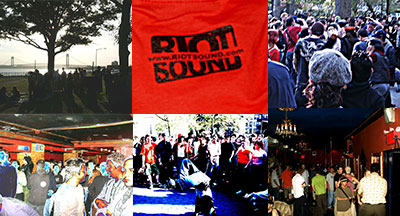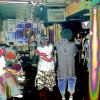by Alex Shtaerman
Dashaun “Jiwe” Morris is still a member of the infamous Bloods gang in Newark, New Jersey and at the age twenty-seven Jiwe sits atop the totem pole of street politics in his city. However, Jiwe is by no means your typical gang member. His is a story as unique as it is universal. Coming from a troubled home, a young Deshaun Morris was recruited to join the Bloods before he was even ten years old. By the time he was eleven, Jiwe had already participated in his first drive by shooting. Perhaps it was his talent for football that contributed to saving his life. A star athlete in high school, Jiwe was recruited to attend Delaware University on a full athletic scholarship. But while he continued to excel on the field, his involvement with the Bloods would ultimately take a turn for the worst as Morris proceeded largely unabated down a path that would subsequently lead to his indictment for attempted murder.
Incarcerated and faced with the prospect of raising his daughter from behind bars, Jiwe began to look deep within himself for answers that would explain his predicament. What began as a soul searching exercise would later turn into a gripping account of street life through the eyes of a full blown gang member. In April of 2008 Jiwe’s first book, War Of The Bloods In My Veins, was published by Scribner, a division of famed publishing house Simon & Schuster. Today Jiwe is a free man and uses his influence and credibility in the streets to uplift at-risk youth across America. Traveling to high schools, colleges and juvenile detention facilities, the man who once embraced a lifestyle that promoted violence now spends his time urging adolescents to forgo the entrapments of gang life and earn for bigger and greater rewards outside the confines of dilapidated neighborhoods and broken homes. Recently we had a chance to catch up with Jiwe to talk about everything from his initial indoctrination into the Bloods and his experience as a football star at Delaware University to his book and community outreach efforts. Make sure you check out this must read interview.
RIOTSOUND.COM: Just to give people some insight into your life story; you are originally from Newark, New Jersey. As a child you moved to Phoenix, Arizona where starting from as early as the 3rd grade you were indoctrinated into the Bloods. For people who aren’t familiar with gang culture, it’s probably very hard to understand how a child can become involved with gangs at such a young age. Can you describe the process through which a youth who is nine, ten or eleven years old can actually become an active gang member?
JIWE: Speaking for myself, in Phoenix, when I first got down with the Bloods, the bottom line was that it was expected of kids to get down with gangs. I relate it to a dog breeding situation where the older homies, they would train the youngsters as early as possible to be animals. It starts off with fighting, stealing out of stores, just little mischievous type of things [one would do] as a youngster. And what I always try to get across to people is that in a gang environment a young gang member is an asset to a turf. The belief is that by the time that youngster gets older, you know, by the time a little homie turn eighteen, nineteen or twenty years old, he gonna be one of the coldest individuals in the set.
And when you dealing with the type of minds – I’m talking about real live gang members – that’s what you want; you want the angriest, the most aggressive, the most hopeless individual you could find. And when you take a young child, like myself – I moved to [Phoenix] when I was nine years old – within two years of learning the ropes and getting an understanding of my environment and the geographical boundaries, at the age of eleven you are being solicited with love or money and attention and comradery. What they are actually doing is manipulating those youngsters into thinking that they owe their life in exchange for protection, for security and for the embracement that they are receiving. So it’s really a tough break for a youngster. I always say that the one thing that we have in common, no matter what ethnicity you come from or what background you come from, it may be African American, Caucasian, Asian, Latino, one thing that we all have in common is that we want to be accepted. We want to be embraced by our peers. And when you’re dealing with individuals as young as I was that are coming from a dysfunctional family, it’s easy to solicit them with certain things to make them feel good about themselves. And that was really my story.
The way I got lured in was largely due to a lot of the dysfunctional situations that I was dealing with inside the household, it made me rebel. A lot of this [gang] stuff, it’s dealing with a lot of rebellion. So my story is no different from many others, but [the point is] that right or wrong a youngster is going to want to feel embraced, he’s going to want to be accepted by his peers. And sometimes if that means doing something wrong, if that means hanging with the wrong people – how many youngsters do you know that’s responsible and that can rationalize and understand that the choices they’re making at that age are going to effect them when they are twenty-five years old? It’s hard to really see past next week when you out there that young. So that’s really where the trap comes in and the manipulation comes in. At that point you have to take the ride and hopefully you’re able to make it up outta there.
RIOTSOUND.COM: You took part in your first drive by shooting at the age of eleven. Generally speaking, when we think of an eleven year old kid, we don’t even think of someone that age having the ability to accurately fire a weapon or have the wherewithal to handle something of that magnitude emotionally. How did you become so hardened at such a young age where you had the ability take part in such acts, not from a moral “right or wrong” standpoint, but rather an emotional standpoint or even a purely physical standpoint?
JIWE: Well, I’d say to those people [who think a child isn’t capable of doing something like that], they could come with me to my neighborhood. I got individuals right now from my neighborhood that’s juveniles that are serving juvenile life. I got cats in my hood that’s not even sixteen years old that’s serving life. So to think that an eleven year old couldn’t accomplish that – I explained it all to a tee in my book, I was scared shitless homie. I didn’t want to be there and I didn’t want to do it. In telling that story I detail how on the way to this event I spotted some youngsters doing some other things and saying to myself if this was really where I wanted to be at? But again, I have a four year old daughter right now and if I put a knife in my daughter’s hand and I told her to cut you with it, she’s gonna do what she’s told, right or wrong.
So at that age, at eleven years old, if you factor in, for one, being scared to be there, and two, having the fear of not doing what I was told and the repercussions that I would have most likely had coming from those that were with me, there was nothing at that point that I would not have attempted to do. And I have to always reiterate the maturity level that comes with it. I didn’t really understand the concept of death. I didn’t really understand the full-fledged concept of shooting being the cause and the effect is taking somebody’s life. That never really registered to me. I knew it was something that they all did because I was living [this life] for two years before this happened. I watched these guys out there shoot and I watched them celebrate after they shoot. I watched them cut people and I watched them celebrate after they cut people. I watched people get trashed, stomped on, mashed out and I watched [the gang members] celebrate after they did this. So there was never that concept of [causing] pain or that this was absolutely wrong to be doing. It was something where it seemed like this was the way it was supposed to be done. And when you’re dealing with somebody at a young age, their minds are like sponges. You could be doing something real hard or real tough or dangerous, but if this is something you’re seeing and experiencing from day one and seeing on a day in and day out basis, it makes it easier to accomplish that task.
“I was told that I wasn’t going to be shit homie,
I’ma be real with you. I was told that anything
outside of putting it in for your turf was not
official, it wasn’t what it was supposed to be”
RIOTSOUND.COM: You eventually returned to Newark in your teens, where you would play and excel at high school football. You were subsequently recruited to attend Delaware University on a full athletic scholarship. How were you able to balance being a top football prospect with your gang activities? When you went to school and dealt with your coaches and professors, were you somehow able to separate them out from your life as a gang member and accept them as authority figures?
JIWE: That wasn’t easy for me to do; when you say that I accepted them as authority figures, that’s not really true at all. I got into a lot of trouble when I went to school. It’s like, you can’t take a pitbull off the street and put him in a family house. If you’re going to do that there has to be a transitional period, you can’t just let him run around in the household with the kids. When I left Newark and went to school there was no transitional period. I took all that I had been doing up until that point, at nineteen years old, and I took all that to that university. I didn’t understand that these people were there for higher education. Everything I saw, I saw it from the gang member’s perspective – how individuals were dressing, the way people played around with each other. Where I was from, certain things we just didn’t accept homie. You couldn’t do certain things and it could be something light, it could be something small, real minute, and that could cost you your damn life where I was from.
So it was hard. I felt fond even to be there but when it came to the cultures, I mean, I was getting into fights on the campus. Plus I was going back home to Newark during the off season and getting into fights, shootouts. I came back to school one time and I was all bandaged up because we got into this big old gang get-down. And my coaches, they really took notice to that because they knew a little bit about my background. When I came back like that – and I was a star at my school – that next two years man, I was not able to come home. They got me housing off campus when school was out, I couldn’t come home for holidays, I couldn’t come home for Christmas, Thanksgiving. I couldn’t come home for anything if I was to remain a scholarship athlete.
RIOTSOUND.COM: Were you resentful about not being able to come home, or did you have a feeling that maybe in the long run some of these people may have been trying to help you?
JIWE: No, no, I did feel that [they were trying to help me]. And I have to always add this part in; football was the only thing that gave me, at that point, a sense of meaning in life, even in high school. Football was the only thing that could grasp my attention outside of being on the turf with my homies. So when it was presented to me in that light where my athletic career was on the line, it made it easy to make that decision. I didn’t take it lightly and I didn’t really appreciate it at the time but I tried my best to not do anything to jeopardize my time there as far as playing football. It was towards the end [of my time at Delaware University] when I started to realize – you stay anywhere long enough and it will start to rub off on you, at least that’s my opinion – and at that point I really started to see the bigger picture. They brought in a therapist for me, they were bringing in counselors for me, all types of things. So I really started seeing things in myself that for many years I had never really been able to make a connection with.
RIOTSOUND.COM: In April of 2008 your first book, War Of The Bloods In My Veins, was published. How did the idea to write a book about your life first come about? Initially you began writing while incarcerated…
JIWE: To be honest with you, I’m twenty-seven right now and I’ve matured a lot over my years. I always say I got an old spirit. I’ve seen a lot at a young age and I feel that life is just about natural progression. It was really my first born daughter that was the inspiration for me to change and I think it was through her that I really knew that it was time for me to wake up and change a lot of my actions. I was healing from a lot of psychological pain from my gang experiences and I began writing my book when I was in prison. Shit, I ain’t had nothing but time in there homie, I was on 23 and 1 [Editor’s note: when a prisoner is on “23 and 1”, they are only allowed out of their cell for one hour each day]. When I was in [prison] I even encouraged some of the other Bloods that was in there with me to begin writing because it was something that was therapeutic for me. I would say it was soul quenching for me.
It was things that I had never discussed, never brought up – forget about talking to strangers about it – so it felt good to actually sit down and write. And I wrote for days homie. I wouldn’t come out to the yard, I had homies bringing me my food, I was just staying in my cell [writing]. When I had the one hour to come out, I wasn’t even coming out for that. I would just take my shower and that was it. It felt like it made my days shorter and my nights easier after filling those composition books up with my life memories. I felt that my story was something that other people could relate to and at some point probably benefit from, so that was really what saved me in that prison. Because before that I was gettin’ off on people, I was going against authorities, I was going at it with COs [corrections officers] and all of that. And once I got a taste of that writing – to this day I still don’t even know what to call it – I don’t even know if I want to call it an epiphany or not but I had never applied myself to writing like that.
A lot of people ask me “you graduated from high school and you went to college so why would that have been such a long shot?” I tell you homie, and I’m not proud to say this, but I wasted a lot of time in high school and college. I got passed through a lot of shit, I didn’t do much while I was there. They wanted me to perform on that [football] field and other than that I did what the hell I wanted to do. So I never really applied myself. And at that point where my back was against the wall and I was confined to that cell, I think that [enables] anybody to dig deep. Rather you grasp on to what you find about yourself or you don’t, but for me, I did. I looked at myself deep and I realized that wasn’t the place I wanted to be. I had a little girl coming and I didn’t want to raise my daughter from no prison cell. So I began to try to dissect my life and just try to pinpoint things that didn’t make me happy and things that did make me happy and really try to get on that path to do more things to make me happy and keep me safe and get me home to my little girl.
RIOTSOUND.COM: Did you surprise yourself over the course of writing War Of The Bloods In My Veins, as far as some of the emotions and feelings that came out as a consequence of taking such a detailed look at your own life and personal experiences?
JIWE: Writing that book was emotionally draining for me; it taught me a lot about myself in those areas that I now know steered me in the wrong direction. A lot of times when I was writing I was overwhelmed. I was angry, I was sad, it was hard to go back into my mind and pull out all of those ideas. I had to come to terms with where I had been, where I was and where I wanted to go. It was shocking to me sometimes because not often do we get our life pulled back up before us. We live life and we move on but not often do we really get to have chapter by chapter, section by section, page by page broken down and put right before us. So it wasn’t the easiest thing for me to do but I believe it was one of the healthiest things for me to do, as far as putting my story out there.
And the objective was really for me to help others. I knew [it could help others] because I felt that it was helping me. When I wrote [the book] I felt relieved, I felt like I alleviated a lot of pain off my shoulders, so I knew it was something that had to get out there. Then I started letting the homies read it and that’s really when I knew that I had something because I wasn’t just telling war stories in my book, that really don’t do nothing for me, I done been there and done that. It was really the emotional part behind the shit we was doing that was really doing something for me man. I mean, it was getting to me. So I believe there is power in revealing your story. You heal from you revealing the pain that you’ve been through and other people can heal and learn from that as well. So I was fortunate enough to have the opportunity to do something like that.
RIOTSOUND.COM: As far your affiliation with the Bloods today, where does that stand?
JIWE: Well, first, I’m still Blood homie. I’ve been Blood for seventeen years. You don’t just pick up and disassociate yourself – well, I’m going to speak for myself, to each their own. My family, we all Blood, my godfather, this man adopted me, T. Rodgers, he’s the co-founder of the Bloods and I credit a lot of my change to that man right there because that man lives a more peaceful life now. So as far as my interaction with the streets now, I’m real active, I’m hands on. I speak around the country and I’ve been given an opportunity where I don’t know any of my peers who has been given an opportunity such as this.
Because I have some wisdom and knowledge in my story I travel around the country and do events; there’s not many states that I haven’t been to. I’ve been to universities, I’ve been to high schools, middle schools, I’ve been to juvenile facilities; not so much to tell these youngsters what to do – that’s one thing I stay away from, telling them what to do. What I do is really just try to paint a picture for them and just try to motivate them and inspire them that they could be more than what they hood is telling them they could be. I was told that I wasn’t going to be shit homie, I’ma be real with you. I was told that anything outside of putting it in for your turf was not official, it wasn’t what it was supposed to be. And I believe that those were some of the biggest lies you learn growing up that way, that this is all that you can be.
And I tell you, my homies is some of the most talented people. I got homies that can sing – and I’m not just talking about rapping, because now everybody wanna be a rapper – I’m talking about something outside of that because the hood pumps that crap in your head that all you could do is be a rapper, a super gang banger or you’re going to make it in the NFL somewhere. I got homies that rap, sing, play instruments, all types of things that the hood would not allow them to pursue. And I’m past that now man. I feel that by nature we are all good individuals, it’s just a lot of times our circumstances will dictate what you can be and I think it’s that resistance right there that we gotta start fighting. And I believe it starts with people like me. [Youths] can look at me and they can see themselves. They gonna still see me in my khakis and my [Converse] All-Stars but that don’t determine who the hell I am, dog. That’s how I live my life now and that’s the motivation that I try to pass on to the younger generation.
The hood ain’t going nowhere. If you fourteen years old or you thirteen, you can’t just pick up and leave outta your turf, but at the same time you gotta survive out there as well. So, a lot of times we want to disarm these youngsters, we want to tell them to walk away from the gang but we don’t have nothing to substitute that with. My pop always tell me “you take something from a youngster, you better replace it with something”. And that’s something that at this present moment we are not able to do. So, what I do is I just try to spark some hope in them, ignite a fire in them so they can figure out what it is that they want to do and things they want to accomplish and then set them on a path to start achieving that. And through all that they are going to still jump over some hurdles because the hood is not going nowhere. I’m blessed that I’m even in a predicament where [the youngsters] can look at me and say “look, a Blood did it, a Blood is doing something with himself right now”. That’s the gratification that I get out of the whole deal.
“We want to tell them to walk away from the gang but we
don’t have nothing to substitute that with. My pop always
tell me “you take something from a youngster, you
better replace it with something”. And that’s something
that at this present moment we are not able to do”
RIOTSOUND.COM: If we go back in time say 30 or 40 years, back when a lot of the street gangs we see today were first formed, many of those gangs originally came about as organizations that actually sought to bring about positive change in their local neighborhoods and communities. Over the years many unsavory elements have crept in to that original paradigm, where today we have a situation where gangs have become synonymous with senseless violence, drug dealing as well as a host of other negative elements. Do you think there could ever be a time in the future where street gangs such as the Bloods and Crips can lay down their arms and become active in their communities in a positive capacity?
JIWE: [Honestly], I really feel that it’s going to be difficult to do that. I think in certain areas of certain neighborhoods – I know hoods now where you go in they neighborhood and they Blood and they on the streets homie. They all in the community and the community don’t bother them because they not out there robbing nobody and they ain’t out there pumping no drugs. I do know a few areas like this, but as a whole man, it’s going to be difficult because gangs thrive off of poverty. They thrive off of projects and low income housing. When a youngster ain’t got nothing, [the gangs] is who he’ll get down with because they’ll make him feel wholesome again. So whenever you have situations and circumstances where you’re dealing with drugs and projects, low income housing, welfare, those are the things that make gangs thrive.
But as far as Bloods and getting it back to the origin of this thing, which was taking care of the neighborhood, I just had a situation a couple of weeks ago on October 31st [Halloween]. Cats were gonna be cutting up women and all this craziness with this new initiation they got out here in Newark. I had Bloods out there on the streets patrolling the streets and making sure that these women were safe man, because I’m not a supporter of any of that. When you’re young and dumb you make mistakes but I’m older now, I have kids myself, so I see the bigger picture. And when I’m interacting with these youngsters I try to get them in tune with that and let them know it’s not about hanging out on this corner and making the lady living in the corner house afraid to come outside.
That’s why the neighborhood has turned on us so much. That’s why they don’t respect us and that’s why we’re shunned and looked down upon because we terrorized and destroyed the community for so many years it’s really hard to come back from that. So, it’s going to take a lot of work and it’s not something that I could do by myself; it takes joining up with people that have say-so in various parts of the country and really putting something together where the people can see what ya’ll are doing, as opposed to them seeing some old lady getting robbed by a guy with a red flag on. That really just undoes a lot of the productivity that we are working for. So it’s going to be a struggle and it’s a long term problem.
RIOTSOUND.COM: There’s a new documentary that will be coming out called Brick City which is directed by Marc Levin and chronicles some of the aspects of gang life in Newark. You actually have a central role in the film; can you talk about that as well as some of the things Brick City will be touching on?
JIWE: [The film] is just about life in Newark, all the way around the board, from City Hall to the streets. It’s from the cemeteries to the little homie that just got out of prison that’s out searching for jobs. It’s about the killing that took place in Newark of three college students and what started that whole issue. As far as my role go, nothing really go on in my city without me being involved, politically from the street perspective. So when they asked me to be involved with [the project], once I understood what the overall objective was I signed on with it and I just gave them access to my hood. I let them go up there and talk to my little YG homies so they get to see what’s on they mind. I also invited them to a lot of the functions that we have. [Brick City] is just the day to day life in Newark, but also, with me, it’s my transition; I’m trying to transition from a gang member to fatherhood. Because my child don’t need no gang member, she don’t need no OG daddy. That does nothing for her, she need a father.
My interaction with the homies [now] is merely one of just productivity; I travel, I keep them with me. Whenever I have events – and you’ll see this all on the documentary – I take them with me. I expose them to things that they never seen before. And I feel good doing that because when I was growing up we didn’t have none of that. You didn’t have nobody that was from the turf that was doing anything but slanging some rocks or going in and out of the pen. And I think that right there really limits your mind and what you think you can be. So I enjoy exposing them to things, taking a four hour trip or we all get on a plane and they flying around with me on my book tour. That right there is satisfying to me and that’s a lot of what Marc [Levin] captures in this documentary – just to put a human side to a lot of the animalistic activities that’s going on out here.
RIOTSOUND.COM: Is it true that Marc Levin also has plans of making your book, War Of The Bloods In My Veins, into a movie?
JIWE: That will definitely be coming out after Brick City. As we’re speaking right now I’m actually in negotiations with a few filmmakers, Marc Levin is one of those filmmakers. I actually have a meeting with him coming up with my entertainment attorney about optioning my book rights and my life rights to a movie. That’s all in preparation as we speak. That’s pretty much all I can say but [the book] is definitely gonna be optioned off into a movie.
RIOTSOUND.COM: For any young kid that may be reading and is perhaps having thoughts of becoming involved with gangs, what would you tell that person?
JIWE: I do have two messages that I speak with these youngsters about. I travel around and I do events; if I go to a school in the inner city of Newark, that message to those fifteen or sixteen year old youngsters is going to be a lot different as opposed to when I travel to a suburban school in Virginia. A lot of these cats [from the suburbs] are out here to join these gangs just “to be down”. There’s really nothing that’s going on in their lives where they’re being forced to do this or their circumstances are so unbearable and overwhelming that the gang life is all that they have to turn to. A lot of these cats become gang members because they see Lil Wayne on TV, they see Game on TV, Snoop and them. Those [artists] have created a lot of those type of gang bangers. Those are the guys that I oppose getting down with this lifestyle. Those are the youngsters [I tell] that they don’t want to get down with this, because once you get involved with this you have to take the ride. You have to accept and endure all that comes with this thing.
[On the other hand], a lot of us don’t have a choice. I didn’t have the choice to choose to be in a gang or not because I would have continued to be a victim every day. And you cannot ask no youngster to voluntarily become a victim. I was just faced with an unfortunate circumstance. So my message to a youngster like myself, I’ma tell him you gotta keep fighting; you gotta keep fighting and clawing and scratching your way up outta that ghetto. And you do that through education. Because you gotta remember, if you’re thirteen, twelve, eleven years old, you have no control where you can live at. You don’t control if you can pick up and move. So I pray that those youngsters can get through that circumstance and that environment that they living in. And again, you do that through education, so once you become of age, once you turn eighteen, you’ve educated yourself enough where now you can make choices; you can go to college, you can get a trade and begin to work and you can move yourself up outta that environment. This environment breeds gang members. I know guys that’s moved to the hood, just like myself, that wasn’t from the hood, they was from a suburb, and within a year or two or three they turned out. So it’s the environment. And the only way to fight through it is education.
For more news and info on Dashaun “Jiwe” Morris check out www.JiweEra.com































Comments